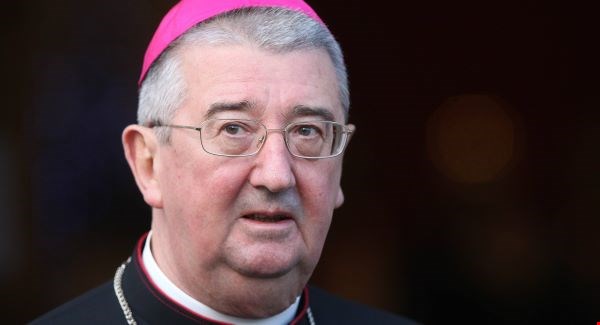Secrets of the powers that be
“Some people seem to like giving interviews.” These were the words typed on a card from the Pontifical Council for the Family in Rome. It was sent on January 2, 1986 to Geoffrey Keating, the Irish Chargé d’Affaires in Rome, by Monsignor Diarmuid Martin (as the present Archbishop of Dublin then was).
The subject of this comment was a report in Il Regno by Archbishop McNamara, the then outspoken and hence controversial archbishop of the day, who died in office in April 1987.
Keating forwarded the article to Iveagh House with a cover in which he remarked that it was well-informed and reflects accurately – and in more detail – the view of the Archbishop. Msgr Martin had described to Keating the journal that published it as “a left-wing Italian Tablet”.
Moreover: “Msgr Martin was particularly struck by the Archbishop’s suggestion that whatever form Irish unity took, it was possible to foresee a situation where divorce was permitted in the North but not in the South. He thought this was a new idea and one which had not been heard before from a member of the hierarchy. I reminded him that a former Taoiseach had made similar remarks some years ago in an interview and had encountered some criticism on the matter.”
This intervention was followed by a speech by Archbishop McNamara which was reprinted in the English version of L’Osservatore Romano (January 20, 1986). This had originally been delivered at meeting of Family Solidarity, which had provoked criticism due to its reference to pluralism and divorce. The editor of the English language edition Fr Seamus O’Byrne told Keating that the appearance of the article (one of several requested from English speaking bishops) had been delayed and it appearance was therefore of less significant than it seems.
“Msgr Diarmuid Martin of the Pontifical Council for the Family had told me that it would appear and also that he had strongly advised omitting any reference to Family Solidarity, which he thought was a rather extreme group.
“As you can see, his advice was accepted by the editor, and the piece appears simply under the Archbishop’s name with no further reference. In any event, as the paper only sells 800 copies a week in Ireland, it may well go unnoticed.” Archbishop McNamara had called pluralism “an elusive concept” which would only lead to confusion “when questions of law and morality are concerned”.
Earlier (on December 20, 1985) in reporting again to Iveagh House Keating had remarked that “Diarmuid Martin was the person responsible for briefing the English language journalists during the recent Extraordinary Synod. You may have noticed that his brother, Seamus, was covering the event for the Irish Times which may explain the lengthy and authoritative coverage of the Synod which appeared in that paper.”
These experiences with untimely remarks and the hidden influences on the press may well have shaped Archbishop Martin’s own careful treatment of current affairs in more rerent years.


 Peter Costello
Peter Costello Archbishop Diarmuid Martin
Archbishop Diarmuid Martin